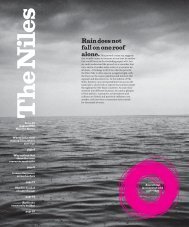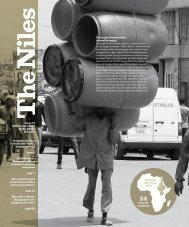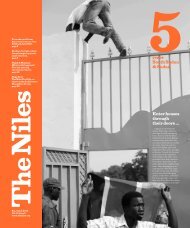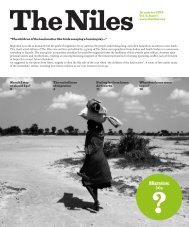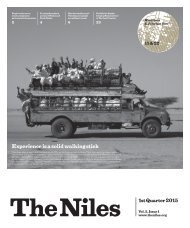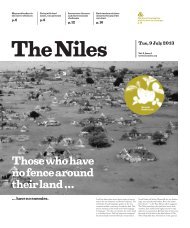When deeds speak, words are nothing
Speaking about sustainable development is easy. Acting sustainably is another matter. And now the evidence is unequivocal: Mankind’s impact on nature is causing the climate to change rapidly and drastically, threatening the environment and the very resources we need to survive. Aware that humanity is careening close to the edge, The Niles correspondents set out to explore where and how people in the Nile Basin region rethink. So much of their findings for now: We are an endlessly innovative species. Cooperation is our superpower. When deeds speak, words are nothing.
Speaking about sustainable development is easy. Acting sustainably is another matter. And now the evidence is unequivocal: Mankind’s impact on nature is causing the climate to change rapidly and drastically, threatening the environment and the very resources we need to survive. Aware that humanity is careening close to the edge, The Niles correspondents set out to explore where and how people in the Nile Basin region rethink. So much of their findings for now: We are an endlessly innovative species. Cooperation is our superpower. When deeds speak, words are nothing.
You also want an ePaper? Increase the reach of your titles
YUMPU automatically turns print PDFs into web optimized ePapers that Google loves.
Preparing for climate
change impacts
in the Nile Basin
2.3°C
TEMPERATURE
of 81 average Global
Circulation Models
(GCMs) around 2039
(when global average
temperature will hit
2°C) compared to the
pre-industrial period
(1861-1900)
in °C
1.6
2.2
2.5
2.8
PRECIPITATION
of 78 average Global
Circulation Models
(GCMs) around 2039
(when global average
temperature will hit
2°C) compared to the
pre-industrial period
(1861-1900)
in mm/year
-30
-10
0
10
20
50
100
200
300
1.5°C
Rising temperature
reduces water productivity
2.7°C
policies must be reformed; cultures and
structures entangled in colonial history and
economic models that perpetuate discrimination,
inequality, and environmental destruction
must be abolished.
After all, low-income communities everywhere
suffer the consequences of bad policies
and climate change the most, while having
contributed little to the crisis themselves. Therefore,
it is critical to give more space to marginalised
voices beyond individual sustainability
– because the resulting policies primarily
affect the homes of the very people who have
the least say in our society.
Let’s face it, we humans are massively
interfering with the earth’s ecosystems. The
destruction of the environment has triggered
a global climate crisis and has caused species
extinction at an unprecedented rate. But it is
not too late to save the ecological diversity of
our planet, including our very own species.
The science is clear on what we need to
do: cut greenhouse gases to zero and protect
the wetlands, soils, forests rivers and oceans
that absorb our impacts.
Back to the board game analogy, we need
to understand the overarching goal and use
all the pieces to achieve it. This means trying
out multiple strategies, and, above all, grasping
that the board is bigger than we think.
Reversing the progressive decline of nature
while combating social inequality requires a
fundamental rethink of the policies that govern
us and the way we invest, use resources, live
and work, eat, use land and communicate.
And no one can be left to lose. We have
to play this game collaboratively to win!
2.5°C
-0.1°C
Increasing difficulty in
maintaining cropping calendars
(because of change of climatic
patterns)
1.2°C
Increasing recurrence
of floods & droughts
2.4°C
0.5°C
Heavy rains threaten
livelihoods & property
5









